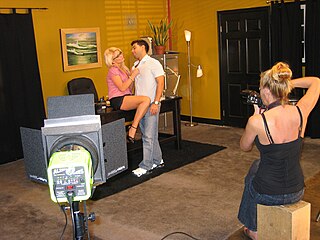 Fucking Machines logo | |
Type of site | Autoerotic; Internet pornography |
|---|---|
| Available in | English |
| Owner | Kink.com |
| Created by | Peter Acworth |
| URL | Official website |
| Commercial | Yes |
| Registration | Required |
| Users | 10,900 visitors per day [1] |
| Launched | September 25, 2000 [2] |
| Current status | Active |
Fucking Machines (also known as fuckingmachines.com and fuckingmachines) is a pornographic website founded in 2000 that features video and photographs of women engaged in autoerotic sexual stimulation with penetrative sex-machines and sex toys. Based in San Francisco, California, the site is operated by Kink.com. Web entrepreneur Peter Acworth launched Fucking Machines on September 25, 2000, as his company's second website after Kink.com. Devices shown on the site were created with the intent to bring women authentic orgasms. Performers were instructed to allow themselves to be recorded experiencing pleasure.
Contents
- History
- Film production
- Trademark appeal
- Analysis
- See also
- Footnotes
- References
- Further reading
- External links
After the site applied in 2005 to trademark the phrase "fuckingmachines", the United States Patent and Trademark Office (USPTO) denied the application and ruled that the mark was obscene. Free speech lawyer Marc Randazza represented the site and appealed the decision. Orlando Weekly called his legal brief "one of the most entertaining legal documents you're likely to come across." [3] The appeal was denied in April 2008 and the case was terminated. Randazza's argument in the case became known as The Fuck Brief.
The website has been the subject of attention from journalists and academics studying sexuality. Writer Regina Lynn highlighted the site's emphasis on communication, and Annalee Newitz of AlterNet classed it as part of Porn 2.0. Violet Blue wrote in The Adventurous Couple's Guide to Sex Toys that it helped popularize the idea of machines aiding in sex acts. The 2008 edition of The Oxford Encyclopedia of Women in World History described the aesthetic of the devices as disturbing. Jessica Roy wrote for The New York Observer that Fucking Machines' examples of orgasms were a form of transhumanism. Sarah Schaschek devoted a chapter to the phenomenon in Screening the Dark Side of Love: From Euro-Horror to American Cinema, titled "Fucking Machines: High-Tech Bodies in Pornography". She observed, "Strictly speaking, the women in these videos are both the controllers and the controlled." [4]


















